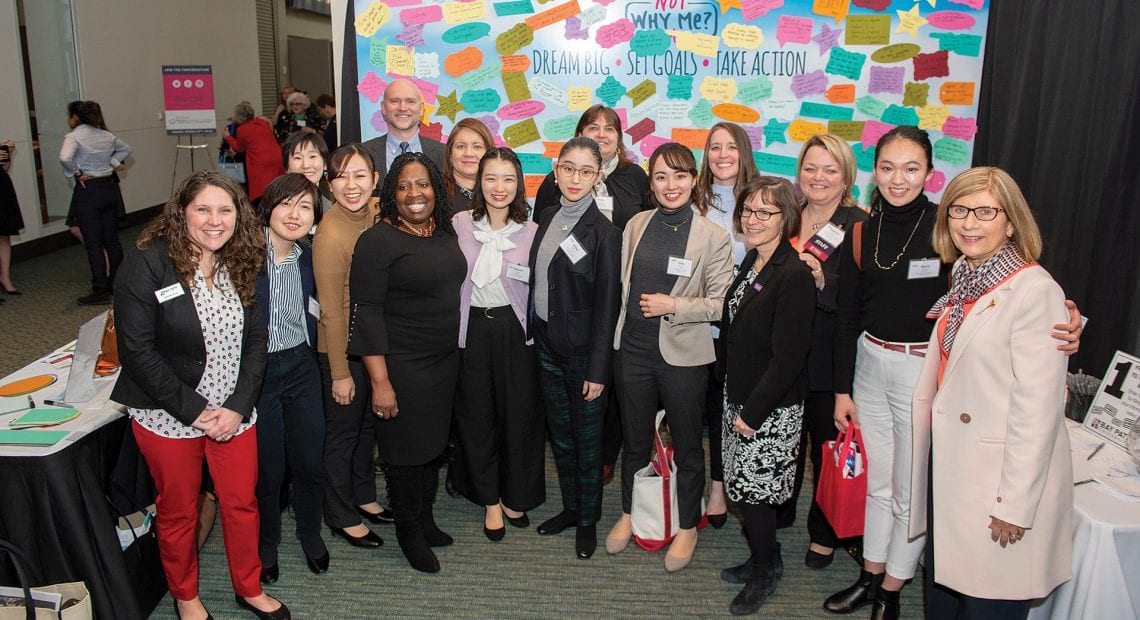Exchange of Ideas

President Carol Leary (right) and other Bay Path leaders with the group of visitors from Jissen Women’s University in Tokyo.
Bay Path University has a long history of forging paths for women to work together, and this year that involved helping students cross oceans and continents to learn from one another.
Six students from Jissen Women’s University in Tokyo, Japan recently ventured to Bay Path to partake in a week of learning, adventure, and cultural interchange as a part of a new hybrid exchange program between the two universities. Bay Path was selected as one of only two U.S. institutions to take part as part of the TEamUP project pairing U.S. and Japanese institutions together to develop a dual hybrid exchange program and Collaborative Online International Learning (COIL) course.
During their weeklong stay, students from Jissen were able to visit the Bay Path campus, where they met with students, took in a student theater production, and had tea with Bay Path President Carol Leary. They also visited New York City, Boston, Northampton, the Springfield Museums, LEGO, and Yankee Candle, and ended their trip at the Bay Path Women’s Leadership Conference and a farewell dinner at Red Rose Pizzeria. Next month, students from the American Women’s College (TAWC) at Bay Path will visit Japan.
The program, made possible by support from the Japan-U.S. Friendship Commission, goes beyond international travel and includes student collaboration in an online course that the Japanese and American students will take together, with curriculum to be jointly developed by the partners. This aspect of the program gives these students, in particular the adult non-traditional students of TAWC who may have work commitments or children at home, a chance to experience another culture firsthand.
“This innovative model for international exchange will offer women, who might not otherwise have the opportunity, the ability to participate in a culturally rich and diverse learning experience,” said Veatrice Carabine, deputy chief for Partnership Development at the American Women’s College. “We are grateful for the generous support of the Japan-U.S. Friendship Commission in supporting this exciting opportunity for our students.”
Advancing the Mission
Advancing the higher education of women and preparing them for leadership roles in their professions and communities is central to the respective missions of TAWC and Jissen Women’s University, and the education this collaboration hopes to provide will extend far beyond their trips. Students will examine values related to women’s moral and ethical leadership in Japan and the U.S., including issues of social justice, diversity, and service to others. Through an experiential learning lab, students will assess leadership styles in these cultural contexts and think critically and creatively about the necessity of vision, trust, and cultural awareness to gain strategic competitive advantages for action in a global world.
“Students will have impactful opportunities to share and exchange global perspectives, compare and contrast women’s roles and leadership, and use technology tools to complete projects across time and space — not to mention develop relationships with Japanese friends.”
“I’m thrilled to partner with the Japan-U.S. Friendship Commission and Jissen Women’s University to share collaborative, cross-cultural learning experiences to students at the American Women’s College, both through the course content and learning activities, as well as through the travel and hosting opportunities,” said Maura Devlin, deputy chief learning officer at the American Women’s College. “Students will have impactful opportunities to share and exchange global perspectives, compare and contrast women’s roles and leadership, and use technology tools to complete projects across time and space — not to mention develop relationships with Japanese friends.”
In a time of increasing globalization, bringing together women of different ages, backgrounds, and nationalities to learn from one other and equipping them with a greater sense of confidence, leadership, cultural awareness, and connectedness to a global world can be a powerful strategy for empowering women to address the world’s most challenging issues, and that has always been at the heart of Bay Path’s mission, she added. For the students involved, this experience will broaden their understanding of how women’s leadership can be applied to influence organizational change in differing global contexts, as students’ own leadership skills, cultural awareness, and confidence in engaging with others globally are developed.
This article first appeared on the Bay Path University blog; www.baypath.edu/news/bay-path-university-blogs






